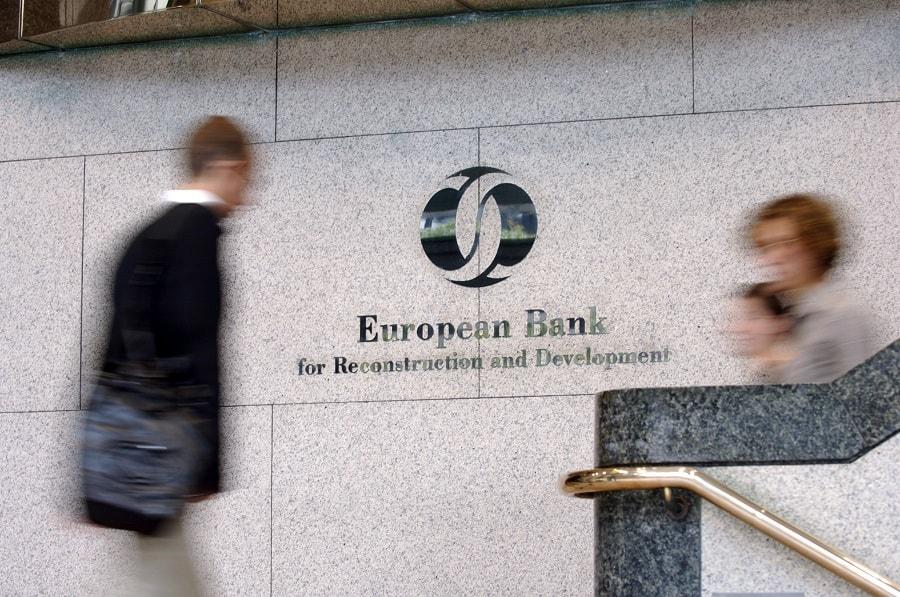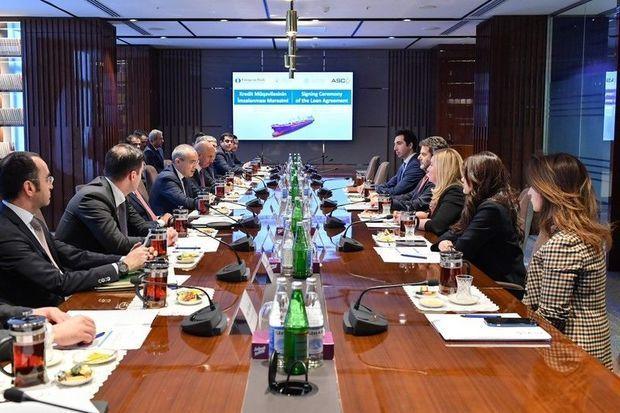Azerbaijan's longstanding partnership with EBRD is a success story Business interest prevails over political agenda
Since late last year, anti-Azerbaijan rhetoric in the political and media spheres of some EU countries has become more strident. The slanderous accusations of some European politicians, who are Islamophobic and nationalistic, have been supported by the most unlogical resolutions of the French Senate, the European Parliament and the PACE, which demand that our country be sanctioned. However, the realities of global geopolitics and business interests usually dictate quite different decisions.
In the course of negotiations, representatives of the European Commission and other EU executive structures are discussing the prospects of expanding business partnership with Baku in the fields of energy, transport and the environment. The extent of this interest is confirmed by the statistics of the European Bank for Reconstruction and Development (EBRD), which were presented the day before. They show an increase in loans for projects in Azerbaijan.
Azerbaijan has no plans to join the European Union, as it pursues an independent foreign policy and adheres to the principles of non-alignment. In his speeches, the President of Azerbaijan, Ilham Aliyev, has repeatedly stated that there are no such plans. Furthermore, even within the framework of the Eastern Partnership programme, Baku has kept its distance from dubious political initiatives and has always focused on cooperation in the fields of energy, transport, trade, implementation of the best European practices in IT technologies and so on.
The EU and Azerbaijan have begun to expand their economic cooperation. This has been prompted by the escalation of the Russian-Ukrainian war, which has led to critical changes in the supply chain of energy raw materials and mineral resources, as well as the disruption of transport and logistics links in the Eurasian space. In particular, the Memorandum of Understanding on Strategic Partnership in the Energy Sector with the EU was signed in July 2022. The Memorandum envisages that Azerbaijan's natural gas supplies to European countries will increase to more than 20 billion cubic metres. In the same vein, the implementation of the Black Sea Energy submarine power cable project, which will export "green" electricity from Azerbaijan and, in the future, from Central Asian countries, can be considered together with the EU.

Equally promising are joint projects with Europe to export "green" hydrogen through the Southern Gas Corridor (SGC) gas pipeline system, efforts in energy efficiency and the climate agenda, as well as efforts to expand transit between the Old World and Asia within the Middle Corridor, etc.
In recent years, European Commission (EC) President Ursula von der Leyen has repeatedly underlined the importance of partnership with Azerbaijan in energy security and transport initiatives, stressing that these efforts bring EU countries closer to Azerbaijan and other Caspian countries.
And it seems that despite the current escalation of anti-Azerbaijan rhetoric placed on the agenda of European structures by Armenian lobbyists, the pragmatic policy of the European Commission is the most accurate indicator of our country's relations with the EU states. "Nothing personal, it's strictly business" - this well-known formula is seen in a new light as an optimal platform for building long-term cooperation without trying to push ideological and political clichés to the detriment of economic expediency.
The fact that such an approach is understandable and probably acceptable to all parties is clearly demonstrated by indicators of cooperation between the EU's main financial institution - the European Bank for Reconstruction and Development - and Azerbaijan. According to the statistics published the day before, last year the EBRD allocated loans for the implementation of projects in our country in the amount of 156 million euros. This is 1.8 times more than in 2002 when the loans through the Eurobank amounted to 86 million euros.
Moreover, according to the new country programme, the EBRD does not plan to reduce project financing intensity and intends to provide Azerbaijan with soft loans worth $750 million in 2023-2025, and possibly more. In general, at the beginning of 2024, Eurobank's portfolio in Azerbaijan amounts to €897 million for 31 projects. Most of the loans (90 per cent) are for infrastructure and transport projects, 7 per cent for industry and agribusiness and 3 per cent for the financial sector.
It should be noted that the EBRD has been one of the oldest and leading foreign lenders to us. The Bank has provided more than €3.624 billion to finance 189 projects since 1992, when full partnership between Azerbaijan and the Bank began. More than half of the funds over the past three decades have been used to implement energy projects such as Shah Deniz-2, TANAP and TAP. In turn, the Government of Azerbaijan and the EBRD are currently discussing the prospects for future loans to increase the capacity of gas compressor stations and other infrastructure in the Southern Gas Corridor: all of these steps are aimed at increasing gas supplies, and a preliminary feasibility and financial assessment has already been launched.
While maintaining its interest in promising hydrocarbon energy projects, the EBRD's Board of Directors is increasingly seeking to shift the vectors of cooperation with Azerbaijan towards renewable energy sources (RES). The EBRD's targeted programmes include the development of the Caspian-EU energy corridor, technical assistance for green hydrogen production and export projects, and promising cooperation on energy efficiency projects in the municipal sector, industrial decarbonisation initiatives and environmental projects.
The alternative energy sector is probably the vector with the highest priority in the Bank's non-resource lending portfolio. Last year, EBRD provided a $167 million syndicated loan to ACWA Power Azerbaijan Renewable Energy Limited Liability Company for the 240MW Absheron-Khizi wind farm. Looking ahead, Eurobank is considering financing other renewable energy projects, including offshore wind generation in Azerbaijan's sector of the Caspian Sea and participation in the 1 000 MW, 1 195 km Black Sea Energy Cable.
With the support of the EBRD, work is underway to develop a hydrogen strategy for Azerbaijan: an inter-ministerial working group has been set up to develop the strategy in 2021, and the consultancy Advision, with the participation of Eurobank, is involved in the development of a "Low Carbon Hydrogen Economy Market Study". This country paper aims to develop regulatory and financial instruments and assess the opportunities for the production and export of green hydrogen to the global energy market.
During the meeting held in Baku in early February 2024, representatives of the EBRD and the Ministry of Economy of the Republic of Azerbaijan discussed the prospects for cooperation in implementing best practices in the field of green energy and energy efficiency, including in preparing for the UN Climate Change Conference UN COP29 in the country.
It should be noted that there is good joint experience in this respect within the framework of the European Union's Green Cities Programme (GCAP): projects on solid waste management and automation of street lighting systems in Ganja have been implemented with the help of two EBRD loans, and it is expected that in time GCAP programme components can be introduced in other cities of the republic, including in the Karabakh region.

The EBRD's country policy is equally promising in supporting transport and developing the Middle Corridor's potential. In particular, the EBRD recently granted a $42 million loan to the Caspian Shipping Company (ASCO): the project (totalling $60 million) will involve the purchase of two Handysize-type dry cargo vessels, which will be used to transit cargo from Central Asia through Azerbaijan and Georgia as part of the Middle Corridor projects.
However, this project is only the beginning of large-scale initiatives initiated by the European Commission to develop the transport and logistics infrastructure of the Trans-Caspian International Transport Route (TITR), organised by Kazakhstan, Azerbaijan, Georgia and Türkiye. Several international donors, including the EBRD, the European Investment Bank (EIB), the European Commission and other relevant EU bodies, plan to provide €10 billion for this purpose. The project aims to ensure sustainable transport links to the Central Asian region, primarily by overcoming bottlenecks in rail and port connections, digitising logistics and increasing the potential of multimodal container transport, which will allow the creation of an efficient route to deliver cargo to Europe in 15 days.
The implementation of energy and transport projects in the Caspian region is impossible without the participation of Azerbaijan, a key regional hub. So it is safe to say that in the long run common business interests will prevail over private differences of ideological and political agendas.








